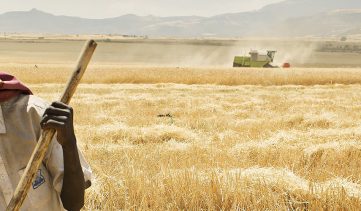Ethiopia is one of the highest performing economies in sub-Saharan Africa. The country has maintained a growth rate of over 11 percent for the last five years and its hunger level, according to the Global Hunger Index, has decreased by more than 40 percent since 2000.
Yet a hunger is still high, and 40 percent of children under 5 years of age are stunted, according to the 2015 Global Nutrition Report.
Ethiopia is committed to further accelerating progress toward food security and nutrition—it is one of Compact2025’s initial focal countries, and Prime Minister Hailemariam Desalegn has joined the Compact2025 Leadership Council.
In a recent visit, Shenggen Fan (IFPRI Director General), Teunis Van Rheenen (IFPRI Head of Partnerships), and Bart Minten (Program Leader of Ethiopia Strategy Support Program) met with officials and experts including the Minister of Agriculture and Natural Resources Tefera Deribew and Economic Advisor to the Prime Minister and Executive Director of the Ethiopian Development Research Institute Newai Gebre-ab.
Two areas that Ethiopia must focus on in their quest to end hunger and undernutrition were discussed. First is resilience to shocks. Because the country is dependent on rainfall for crop production, it is extremely vulnerable to droughts. The most dramatic droughts occurred in the 1980s, but another severe drought is expected this year. However, Minister Deribew emphasized that the country is in a “better position to face this drought than previous ones,” according to Van Rheenen.
Secondly, the need for Ethiopia to build capacity to make sure all programs can work together to accelerate hunger and undernutrition reduction was emphasized. Compact 2025 will “bring knowledge, information, and innovation, and ensure accountability,” IFPRI Director General Shenggen Fan explained. This will go a long way toward building that capacity.



